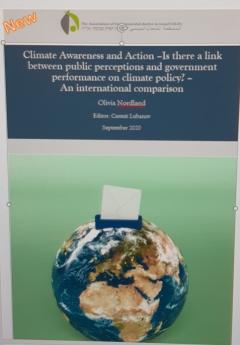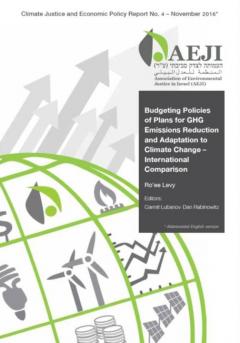Activity FieldsActivities of The Association of Environmental Justice in Israel
A Guide to Assessing the Political Economy of Domestic Climate Change Governance
Working Paper
Jesse Worker and Niki Palmer WRI
| Monday, 22-Mar-2021
guide-assessing-the-political-economy-domestic-climate-change-governance_march2021.pdf
A GUIDE TO ASSESSING THE POLITICAL ECONOMY OF DOMESTIC CLIMATE CHANGE GOVERNANCE
AEJI – Climate Research and Policy Decades of Climate Research 2009 – 2020
| Monday, 15-Jun-2020
list_aeji_climate_policy_docs_and_events_2020.pdf
Decade of Climate Justice - 2009- 2020
Climate Awareness and Action – Is there a link between public perceptions and government performance on climate policy? – An international comparison
Public Perceptions and Climate Strategy | AEJI Synthesis Report No. 2 | September 2020
Olivia Nordland, Editor: Carmit Lubanov
| Monday, 21-Sep-2020
On the occasion of Climate Week 2020, the Association for Environmental Justice in Israel publishes a new study that examines the complex relationship between climate awareness and perceptions and the ambition of climate policy in specific countries via reviewed the literature that gathered the results of key international climate awareness polls that took place for the last 5 years. By observing factors that influence climate awareness and concern at the global and regional level, and by examining climate perceptions and mitigation policy in several countries, the new research provides better understanding for the critical discourse on the link between public climate awareness and political climate action in a particular country and in the global arena.
Our messages for Climate Week 2020:
#Vote_for_Climate
#Climate_Education_for _Climate_Policy
aeji_climate_awareness_and_government_performance_on_climate_policy_international_comparison_september_2020.pdf
New report: Is there a link between public perceptions and government performance on climate policy? – An international comparis
Open Government for Climate Action
Global Gathering of The Access Initiative Network Outcomes Report
The Access Initiative team: Carol Excell, Elizabeth Moses, Jesse Worker,
| Thursday, 02-Mar-2017
The 2016 TAI Global Gathering was held in Paris, France just prior to the Open Government Partnership (OGP) Summit in December. This 5th Global Gathering included 118 participants from 48 countries under the theme “Building a Movement on Open Government for Climate Action.” The overall goal of the 2016 Global Gathering was to catalyze greater collaboration between the open government community, familiar with rights based approaches to governance, and those with technical expertise on climate policy, in order to strengthen national and regional networks for more fair, accountable, and ambitious climate action.
Specific areas of focus included opportunities for engagement around open data, climateaccountability and monitoring the implementation of Nationally Determined Contributions (NDC). Another key area of focus was the need for increased transparency of climate finance and shifting investments to the needs of the most affected, and addressing differentiated impact based on gender, poverty and vulnerability. Sessions were also held to discuss new advocacy strategies for climate protection including in cities, through climate litigation, and parliamentary advocacy.
The report summarizes the key takeaways from Global Gathering Sessions.
AEJI director, carmit Lubanov participated in a session of Climate Change Finance, Policies and Open Data in Asia. This session discussed priorities on climate finance and priority national policies including the need for development of regional standards on climate change. Participants noted a number of challenges in Asia including: 1) lack of policies to increase access to renewable energy; 2) lack of focus on inequity; 3) lack of political will in some countries to take climate change seriously even after natural disasters; 4) lack of policy and legislation in specific countries to drive change (e.g. legislation and policy in India relevant to climate change despite large emission targets).
Participants expressed concerns about the changing geo-political nature of the region; the closing of civic space for civil society; funder priorities to only focus on China and India and the lack of cross country learning opportunities. There has been a move to open up data and there are success stories in China, India and Japan. Difficulties exist across the region including Kyrgyzstan, Laos and in Cambodia which have not agreed to open government principles. It was noted that Indonesia and Korea are members of the OGP.
Conclusion: Platforms for learning and collaboration are needed in the region. Only some countries are part of OGP which may restrict the utility of this forum. There is great potential in action with the private sector in the region and a need to focus the narrative on open data rather than rights (which is often politically contentious). Independent climate finance monitoring and accountability networks in Asia need support and development.
tai_global_gathering_2016_outcomes_report_004.pdf
Global gathering of TAI network outcomes report, December 2016
Budgeting Policies of Plans for GHG Emissions Reduction and Adaptation to Climate Change – International Comparison
Climate Justice and Economic Policy Report No. 4 – November 2016
Ro'ee Levy
| Sunday, 11-Dec-2016
Budgeting Policies of Plans for GHG Emissions Reduction and Adaptation to Climate Change – International Comparison | Abbreviated English version
During 2016, substantial progress was made in the international effort to address climate change: the Paris agreement was ratified; a new international agreement was reached on mitigating GHG emissions in the aviation sector; and an amendment was made to the Montreal Protocol concerning the reduction of use of HFC chemicals that contribute to global warming.
However in Israel, efforts to mitigate GHG emissions and address adaptation to climate change are as yet insubstantial. This document examines budgetary indications related to climate change in a number of countries, in effort to study how the issue is prioritized and to learn lessons from international experience that might be pertinent to Israel's climate policy. It then continueBudgeting Policies of Plans for GHG Emissions Reduction and Adaptation to Climate Change – International Comparison | Abbreviated English version
During 2016, substantial progress was made in the international effort to address climate change: the Paris agreement was ratified; a new international agreement was reached on mitigating GHG emissions in the aviation sector; and an amendment was made to the Montreal Protocol concerning the reduction of use of HFC chemicals that contribute to global warming.
However in Israel, efforts to mitigate GHG emissions and address adaptation to climate change are as yet insubstantial. This document examines budgetary indications related to climate change in a number of countries, in effort to study how the issue is prioritized and to learn lessons from international experience that might be pertinent to Israel's climate policy. It then continues the exploration of climate budgeting via its revenue potential, which can be increased as countries mitigate their emissions by means of carbon taxation or sale of emission permits. Almost all OECD countries presently implement carbon pricing policies.s the exploration of climate budgeting via its revenue potential, which can be increased as countries mitigate their emissions by means of carbon taxation or sale of emission permits. Almost all OECD countries presently implement carbon pricing policies.
report_no.4_climate_budgeting_abbreviated_english_version__2016.pdf
Budgeting Policies of Plans for GHG Emissions Reduction and Adaptation to Climate Change – International Comparison




